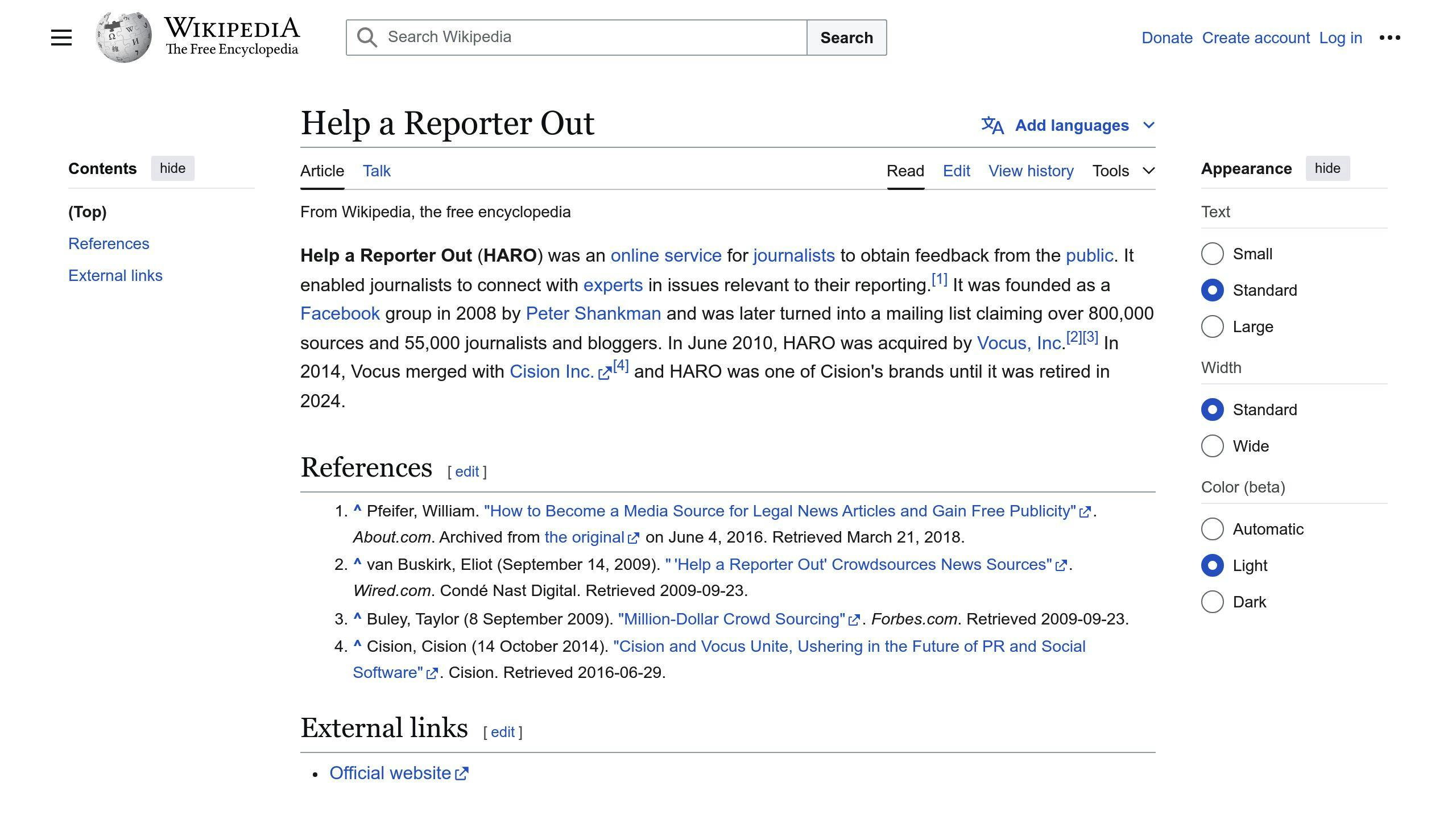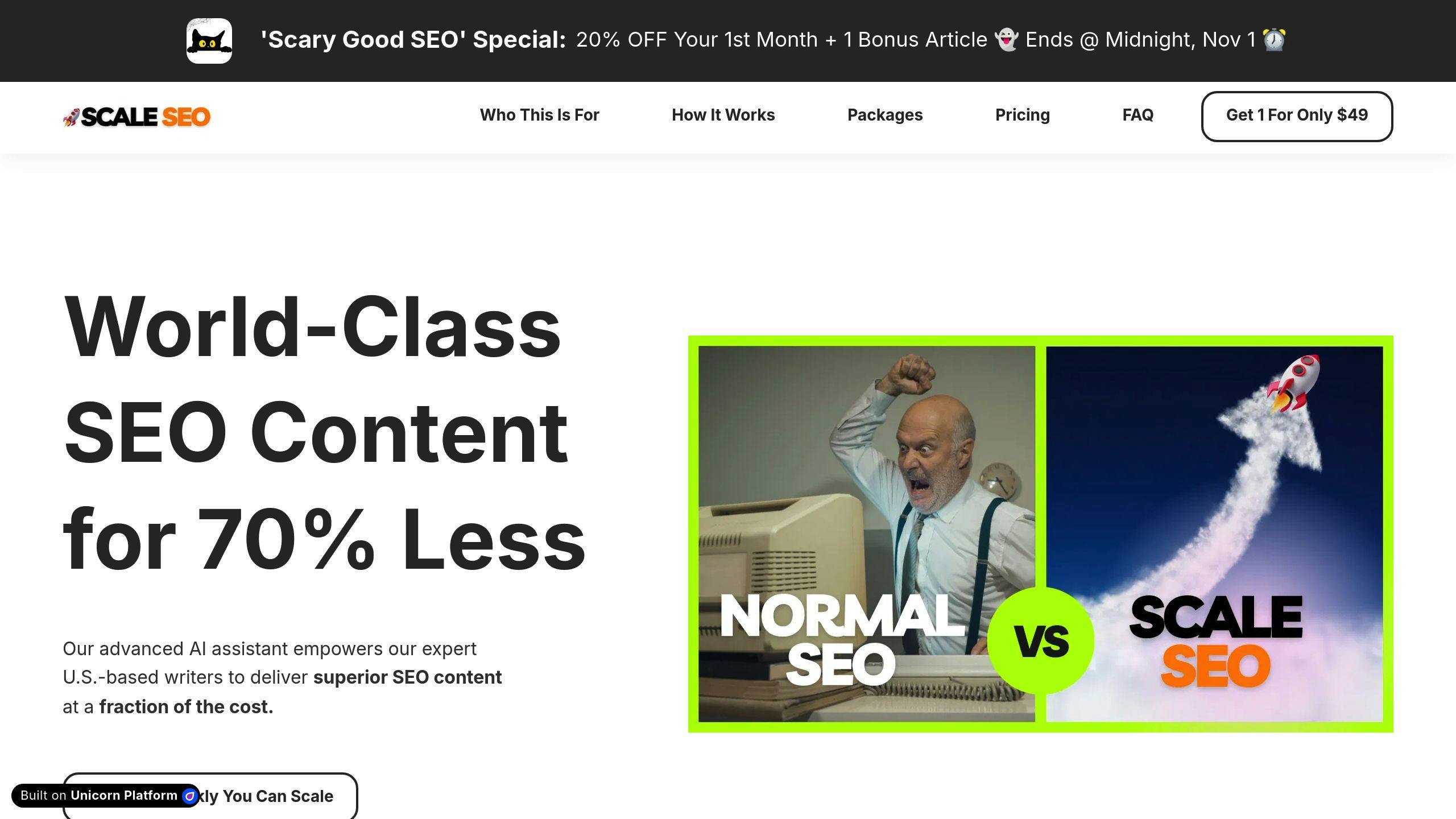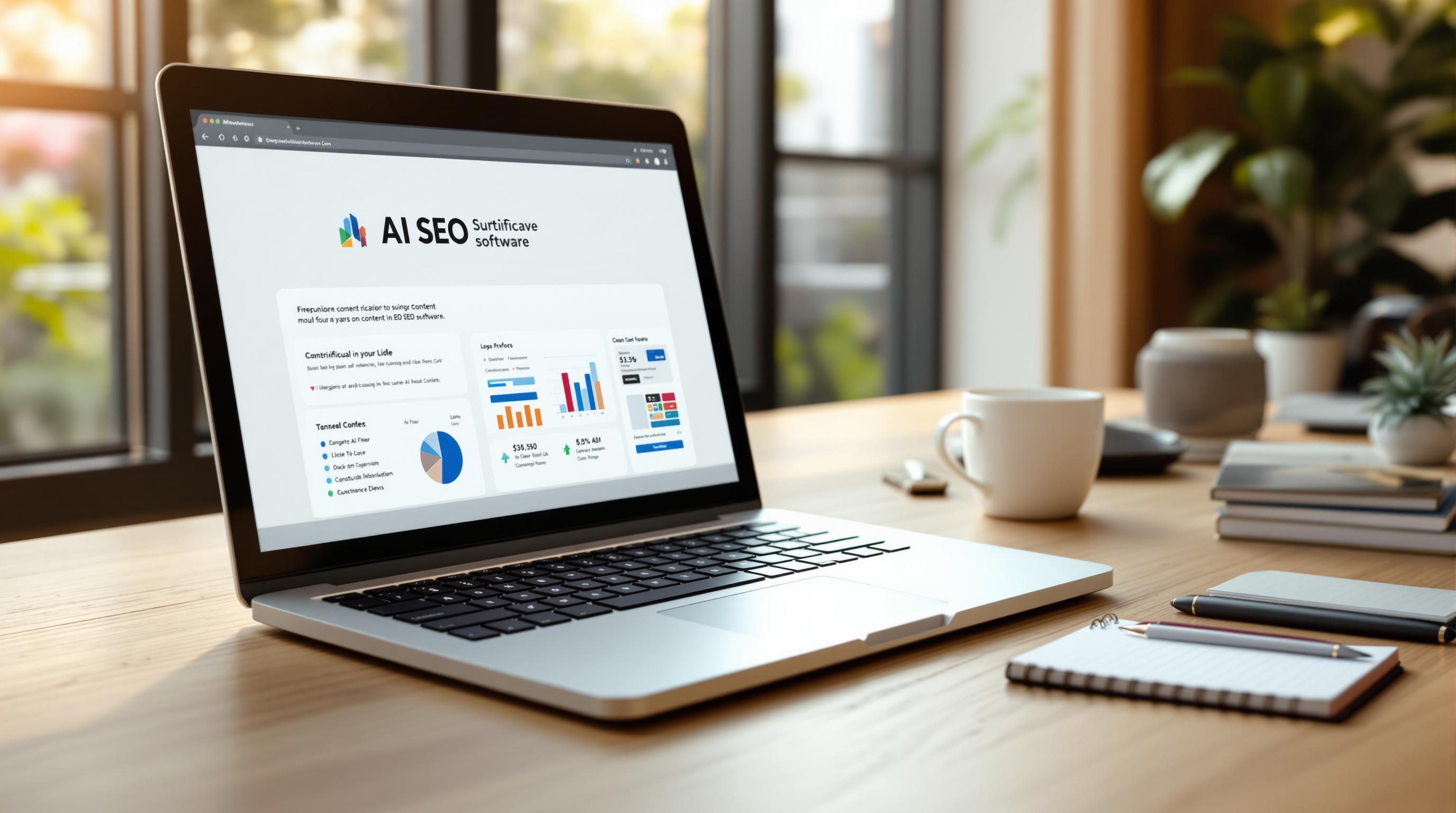Looking for proven SEO strategies to get your small business noticed online? You don't need a Fortune 500 marketing budget to rank higher on Google.
These 7 proven tactics can help you attract more customers while keeping costs low:
- Basic Local SEO Setup
- Writing SEO Content
- Basic SEO Setup
- No-Cost SEO Tools
- Low-Cost Link Building
- SEO Progress Tracking
- Using Scale SEO Services
These strategies can help you:
- Improve search rankings
- Increase organic traffic
- Boost local visibility
- Build brand authority
- Generate more leads and sales
| Strategy | Cost | Time to Results | Potential Impact |
|---|---|---|---|
| Local SEO | $0-$500 | 3-6 months | 30-50% increase in local visibility |
| Content Creation | $0-$2500 | 4-8 months | 50-100% more organic traffic |
| Technical SEO | $0-$1500 | 2-4 months | 20-40% better site performance |
| Link Building | $0-$2000 | 6-12 months | 30-60% higher domain authority |
Remember: SEO takes time, but consistent effort can lead to significant growth for your small business. Start small, track results, and scale up what works for you.
Featured Video: Affordable SEO Services
1. Basic Local SEO Setup
Want to boost your small business's online visibility without spending a fortune? Start with your Google Business Profile (GBP). It's the foundation of a solid local SEO strategy.
Why? Because 46% of all searches have local intent. That's a lot of potential customers looking for businesses like yours in their area. By optimizing your GBP, you're putting yourself right in their path.
Here's how to set up your GBP:
- Claim and verify your profile. It's free and gives you control over how your business appears on Google.
-
Optimize your profile:
- Keep your Name, Address, and Phone number (NAP) consistent across all platforms.
- Pick 2-3 categories that best describe your business.
- Write a compelling description with your main keywords.
- Add high-quality photos of your business, products, and services.
- Keep your info up-to-date. Change your hours for holidays or special events.
- Respond to reviews. Show customers you care about their feedback.
Here's what can happen when you get it right:
"After optimizing our Google Business Profile, our website clicks jumped 150% and direction requests rose 30% in just two months. In-store foot traffic went up 25%." - Sarah Johnson, Bloom Bakery, Portland
But don't stop there. To really nail local search:
- Get listed on reputable directories like Yelp and Yellow Pages. Keep your NAP consistent.
- Add local schema markup to your website. Use Google's Structured Data Markup Helper.
- Create content about local events, news, or topics. Show you're part of the community.
2. Writing SEO Content
Want to rank well in search results without breaking the bank? Here's how small businesses can create SEO-friendly content on a budget:
Target long-tail keywords. These specific phrases are less competitive and can attract more qualified leads.
Answer customer questions. Create content that tackles common queries from your target audience. This matches search intent and might land you a featured snippet.
Structure matters. Use clear headers (H2, H3) with your target keywords. Keep paragraphs short and use bullet points for easy reading.
Nail your title and meta description. Write catchy titles under 60 characters and meta descriptions between 150-160 characters. Include your main keyword and why someone should click.
Go deep, not wide. Aim for thorough articles (1,500-2,000 words or more) that cover your topic inside and out. This builds authority and keeps readers on your page longer.
Here's a real-world win:
"We created in-depth guides answering common industry questions. In 6 months, our organic traffic jumped 210% and leads grew 45%. The cost? Just our time and effort." - Sarah Johnson, TechSavvy Solutions Founder
Free tools to boost your SEO content:
| Tool | What it does |
|---|---|
| Google Keyword Planner | Find keywords and their search volume |
| Answer the Public | Discover question-based keywords |
| Hemingway Editor | Make your writing clearer |
| Google Search Console | Track performance and find ways to improve |
3. Basic SEO Setup
Want to boost your site's search engine visibility without breaking the bank? Here's how to lay a solid SEO foundation:
Google Search Console: Your SEO Command Center
First things first: submit your site to Google Search Console. It's free and gives you a direct line to Google. You'll see how Google views your site, spot indexing issues, and track which keywords drive traffic.
"A simple, well-done WordPress website is going to give you the best chance at ranking. I recommend finding a YouTube tutorial to help you build your WordPress site." - Andrew Peluso, Owner of Bananas Marketing Agency
Sitemaps and Robots.txt: Guiding Search Engines
Think of a sitemap as a roadmap for Google. It lists your important pages, making crawling and indexing a breeze. Use a plugin like Yoast SEO to generate one, then submit it through Search Console.
Don't forget your robots.txt file. It tells search engines which parts of your site to crawl. Double-check it's not accidentally blocking crucial pages.
Security and Mobile-Friendliness: Must-Haves
Secure your site with HTTPS. Google loves it, and it builds trust with visitors. And with over half of web traffic coming from mobile devices, a responsive design isn't optional - it's essential.
Speed It Up
Slow sites are SEO killers. Aim for load times under 3 seconds:
- Compress those images
- Trim down your code
- Use browser caching
Navigation and Structure: Keep It Logical
Help users (and Google) find their way around:
| Element | What to Do |
|---|---|
| URLs | Make them descriptive and keyword-rich |
| Navigation | Create a logical menu structure |
| Internal links | Connect related content |
Schema Markup: Speaking Google's Language
This code helps search engines understand your content better. It might even score you some fancy rich snippets in search results.
Keep at It
SEO isn't a "set it and forget it" deal. Regularly check Google Search Console to catch and fix issues early.
"SEO should be a consideration throughout every step of your website build and your marketing journey." - Ade Lewis, Partnerships Director at Mailchimp
4. No-Cost SEO Tools
Can't afford fancy SEO software? No problem. There's a ton of free tools that can boost your search rankings. Here's what you need to know:
Google's SEO Toolkit
Google's got your back with these free tools:
| Tool | What It Does | Why It's Awesome |
|---|---|---|
| Search Console | Tracks site performance | Spots traffic issues |
| Analytics | Shows user behavior | Reveals who's visiting |
| Keyword Planner | Finds keywords | Uncovers search trends |
| Trends | Guides content strategy | Highlights hot topics |
| PageSpeed Insights | Checks site speed | Helps your site load faster |
Want a quick win? Use Search Console to find your top-performing keywords. Then, create more content around those topics. It's like doubling down on what's already working.
All-in-One SEO Tools (That Won't Cost You a Dime)
These platforms pack a punch without emptying your wallet:
- Ahrefs Webmaster Tools: It's like having a mini-SEO expert. It scans for 100+ SEO issues and gives you the scoop on keywords and backlinks.
- Ubersuggest: Perfect for SEO newbies. It suggests keywords, sparks content ideas, and audits your site.
"Ahrefs Webmaster Tools doesn't just point out problems. It explains why they matter and how to fix them." - Andrew Peluso, Bananas Marketing Agency
Specialized Tools for Specific SEO Tasks
Need to tackle something specific? Try these:
1. Keyword Research
- AnswerThePublic: It's like mind-reading for search queries. Great for finding long-tail keywords.
- Keyword Hero: Combines data from Analytics and Search Console to reveal organic keyword insights.
2. Local SEO
- Localo: Keeps an eye on your Google Business Profile and suggests local keywords.
3. Technical SEO
- Screaming Frog SEO Spider (free version): Crawls up to 500 URLs, finding technical hiccups and creating XML sitemaps.
4. Content Optimization
- Yoast SEO (WordPress plugin): Your personal content coach. It analyzes your SEO in real-time and helps polish your titles and meta descriptions.
5. User Experience
- Hotjar (free plan): Shows you how users interact with your site through heatmaps and recordings.
These tools can supercharge your SEO efforts without costing a penny. Mix and match to find what works best for your business.
sbb-itb-e98aa53
5. Low-Cost Link Building
Want to build quality backlinks without breaking the bank? Here are some smart strategies for small businesses:
Leverage Existing Brand Mentions
Find websites that mention your brand but don't link to you. It's an easy win:
- Use Google Search Console or Ahrefs Webmaster Tools to find unlinked mentions
- Email site owners and ask for a link
"We boosted our backlinks by 15% in two months just by converting unlinked mentions. It cost nothing but time and gave us a nice bump in organic traffic." - Sarah Johnson, TechSavvy Solutions Founder
Guest Blogging for Mutual Benefit
Guest posting is still a powerful way to build links:
- Find relevant industry blogs
- Pitch unique content ideas
- Include a natural link to your site in the post
| Why Guest Blog? |
|---|
| Build relationships |
| Boost brand visibility |
| Drive referral traffic |
| Improve domain authority |
The "Broken Link" Method
This technique helps you AND the site you're contacting:
- Find relevant sites with broken outbound links
- Create content to replace the broken link
- Tell the site owner about your replacement content
Leverage Local Connections
For small businesses, local link building can be a game-changer:
- Join local business groups (often includes a directory listing)
- Sponsor local events or charities
- Write about local news or events
"After joining our city's Chamber of Commerce and sponsoring a charity run, our local search visibility jumped 25% in just three months." - Mike Chen, Chen's Auto Repair Owner
Create Link-Worthy Content
Spend time making content that naturally attracts links:
- Deep-dive guides
- Original research or data
- Infographics
- Interactive tools
The key? Create stuff others want to share and reference.
Use HARO (Help a Reporter Out)

HARO connects you with journalists:
- Sign up free at helpareporter.com
- Answer relevant queries
- Get quoted in articles with backlinks to your site
This builds links AND positions you as an expert in your field.
6. SEO Progress Tracking
Tracking SEO progress is key for small businesses aiming to grow on a budget. Here's how to do it right:
Set Up Google Analytics 4 (GA4)
GA4 is your best friend for tracking organic traffic and user behavior. Here's what to do:
- Turn on enhanced measurement events
- Link Google Search Console (GSC) to GA4
- Build a custom dashboard for key SEO metrics
"After setting up GA4 with enhanced measurement, we found our blog posts were driving 40% more organic traffic than we thought. This led us to focus more on content, boosting our overall organic traffic by 75% in just six months." - Sarah Johnson, TechSavvy Solutions Founder
Track Key SEO Metrics
Keep an eye on these metrics:
| Metric | Why It Matters | How to Track |
|---|---|---|
| Organic Traffic | Shows SEO effectiveness | GA4: Reports > Acquisition > Traffic acquisition |
| Keyword Rankings | Shows SERP visibility | Ahrefs Webmaster Tools (free) |
| Click-Through Rate (CTR) | Measures snippet effectiveness | Google Search Console: Performance > Search results |
| Bounce Rate | Shows content relevance | GA4: Reports > Engagement > Pages and screens |
| Conversion Rate | Links SEO to business goals | Set up goals in GA4 |
Monitor Local SEO Performance
For small businesses, local SEO can be a big win. Use these free tools:
- Google Business Profile Insights: Track profile views, website clicks, and direction requests
- Localo: Keep tabs on your Google Business Profile and get local keyword ideas
Run Regular SEO Audits
Do monthly SEO checks:
- Use Screaming Frog SEO Spider (free for up to 500 URLs)
- Look for issues like broken links, missing meta descriptions, and slow pages
- Check if your content is relevant and uses keywords well
Create a Tracking Document
GA4 doesn't have annotations, so make a Google Sheet to log SEO changes:
| Date | Change Made | Impact (After 30 Days) |
|---|---|---|
| May 1, 2023 | Updated meta descriptions for top 10 pages | CTR up by 15% |
| June 15, 2023 | Optimized images on product pages | Pages load 2 seconds faster |
Set Up Custom Alerts
Don't wait for monthly reports. Set up GA4 alerts for big changes:
- Go to Admin > View column > Custom Alerts > Create a new alert
- Set rules for organic traffic changes (like a 20% drop week-over-week)
7. Using Scale SEO Services

Here at Scale SEO we offer a budget-friendly option for small businesses aiming to boost their SEO game. Our AI-powered content service pairs cutting-edge tech with U.S.-based writers to create SEO-optimized articles that pack a punch.
Here's how Scale SEO can give your small business a leg up in search rankings:
All-in-One SEO Content Solution
Scale SEO handles the whole shebang - from digging up keywords to crafting and polishing content. This means you can focus on running your business while they handle the SEO heavy lifting.
Our service covers:
- Keyword research that zeros in on your business's sweet spot
- Content writing that grabs attention and keeps it
- Smart linking (both internal and external) to build your site's authority
- Image tweaks for better looks and faster loading
- Video embedding to keep visitors glued to your pages
Steady Content Stream
Want to climb those search rankings? You need fresh content, and lots of it. Scale SEO keeps the content flowing, which can seriously boost your search game over time.
Plans That Fit Your Wallet
Whether you're just dipping your toes in or ready to dive deep, Scale SEO has a plan for you:
| Plan | Monthly Articles | Price | You Save |
|---|---|---|---|
| Basic | 1 | $297 | - |
| Growth | 6 | $1,695 | 5% |
| Pro | 16 | $3,870 | 14% |
| Enterprise | 28 | $6,340 | 24% |
Start small, see results, then ramp up. It's that simple.
Quality That Counts
Scale SEO isn't just about churning out content. They focus on:
- Long-form articles that dive deep
- Eye-catching visuals that are SEO-friendly
- YouTube integration for extra engagement
- Article formats that have proven their worth
The result? Content that not only ranks well but also keeps readers hooked and turns them into customers.
Hands-Off Management
Running a small business is tough enough. Scale SEO's straightforward reporting and easy management mean you get all the SEO perks without the headaches. It's like having an SEO expert on your team, minus the extra desk space.
Cost vs. Results Table
Let's break down SEO costs and results for small businesses:
| Strategy | Monthly Cost | Time to See Results | Expected Outcome |
|---|---|---|---|
| Basic Local SEO | $500 - $1,000 | 3-6 months | 30-50% increase in local search visibility |
| Content Creation | $1,000 - $2,500 | 4-8 months | 50-100% increase in organic traffic |
| Technical SEO | $1,500 - $3,000 | 2-4 months | 20-40% improvement in site speed and crawlability |
| Link Building | $2,000 - $4,000 | 6-12 months | 30-60% increase in domain authority |
| Full-Service SEO | $2,500 - $5,000 | 6-12 months | 100-200% increase in organic traffic and leads |
Keep in mind: These numbers are averages. Your results may vary based on your industry, competition, and current online presence.
Now, let's dig into each strategy:
Basic Local SEO
This is your starting point if you're targeting local customers. It's all about optimizing your Google Business Profile, getting local citations, and tweaking your on-page SEO for location-based keywords.
"Our Portland bakery saw a 45% jump in 'near me' searches and 30% more foot traffic in just 4 months after we nailed our local SEO." - Sarah Johnson, Bloom Bakery Owner
Content Creation
Want long-term results? Invest in top-notch, SEO-friendly content. We're talking blog posts, service pages, and other stuff your audience wants to read.
Technical SEO
This is the behind-the-scenes work that can give you quick wins. It's all about making your site faster, fixing broken links, and making sure search engines can crawl your site easily.
Link Building
It's pricey and takes time, but link building can seriously boost your site's authority. The goal? Get backlinks from respected sites in your industry.
Full-Service SEO
Ready to go all-in? Full-service SEO combines everything we've talked about. It's not cheap, but the potential payoff is huge.
Here's a quick look at what different-sized businesses might spend on SEO:
| Business Size | Monthly SEO Budget | Potential ROI After 12 Months |
|---|---|---|
| Micro (1-10 employees) | $500 - $1,000 | 200% - 300% |
| Small (11-50 employees) | $1,000 - $2,500 | 300% - 500% |
| Medium (51-250 employees) | $2,500 - $5,000 | 400% - 700% |
Here's the deal: SEO is a long game. It might take a while to see big results, but stick with it, and you'll see your efforts compound over time.
"We put $2,500 a month into SEO for our online store. After a year, our organic traffic was up 210%, and sales jumped 180%. That's over 500% ROI." - Mike Chen, TechGadgets Online Founder
So, how do you choose? Think about what you want to achieve, how much you can spend, and how long you can wait for results. Start small and ramp up as you see results. With smart, cost-effective SEO, even small businesses can see big growth.
Next Steps
You've got the cost-effective SEO strategies. Now it's time to use them. Here's how to kickstart your small business SEO:
Month 1-3: Laying the Foundation
Start with these basics:
- Do an SEO audit
- Set up Google Analytics 4 and Search Console
- Optimize your Google Business Profile
- Fix basic technical SEO issues
"We fixed broken links and improved site structure in the first three months. Result? 20% better crawlability." - Sarah Johnson, TechSavvy Solutions Founder
Month 3-6: Content Creation and Optimization
| Task | Goal |
|---|---|
| Keyword research | Find easy-to-rank, valuable keywords |
| Content creation | Write 2-4 top-notch, SEO-friendly articles monthly |
| On-page optimization | Boost existing page rankings by 10-20% |
Month 6-12: Link Building and Local SEO
Time to build your online presence:
- Reach out for guest posting chances
- Try the "broken link" method
- Build local citations and backlinks
What to Expect
| When | Possible Results |
|---|---|
| 3-6 months | 30-50% more organic traffic |
| 6-12 months | 50-100% more organic traffic, better local search visibility |
| 12+ months | 100-200% more organic traffic and leads |
SEO takes time. You might see quick wins early on, but big results usually take 6-12 months.
"After six months of SEO work, our organic traffic jumped 45%. At 12 months, it had doubled, bringing in way more qualified leads." - Mike Chen, TechGadgets Online Founder
Tracking Progress
Keep tabs on your SEO progress:
- Use Google Analytics for organic traffic growth
- Check keyword rankings with Ahrefs Webmaster Tools (it's free)
- Track local SEO with Google Business Profile Insights
Keep Improving
SEO isn't a one-and-done deal. To stay on top:
- Update your content regularly
- Keep an eye on algorithm changes
- Build quality backlinks consistently
- Watch what your competitors are doing and adapt
FAQs
Can you do SEO yourself for free?
Yes, you can tackle some SEO on your own without spending a dime. It's perfect for small business owners watching their budget. But here's the deal: while getting pro help might get you faster results, there are plenty of free tools and tactics to boost your website's visibility on search engines.
Let's break it down:
1. Google Search Console (GSC)
This is your go-to tool for measuring organic traffic from Google. Here's how to set it up:
- Head to https://search.google.com/search-console/about
- Log in (or create a Google account if you don't have one)
- Follow the steps to add and verify your site
2. Google Analytics
Use this to keep tabs on how your website's performing and what users are up to.
3. Google Keyword Planner
Research keywords that matter to your business without spending a cent.
4. On-page optimization
You can tweak your website's content, meta tags, and structure yourself.
5. Content creation
Write stuff that your audience actually wants to read. Quality matters!
Now, let's compare DIY SEO to hiring the pros:
| Aspect | DIY SEO | Professional SEO |
|---|---|---|
| Cost | Free to cheap | Pricier upfront |
| Time | Lots of your time | Less of your time |
| Learning curve | Pretty steep | Not much for you |
| Results speed | Usually slower | Often quicker |
| Control | You're the boss | Less hands-on |
"Here's the bottom line: you can definitely do some SEO yourself, but a pro will likely get you better results faster." - Marcus Miller, SEO Consultant


